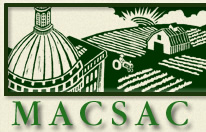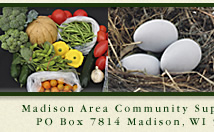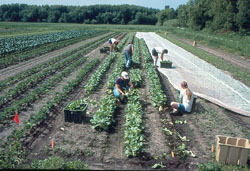 |
 |
 |
Factors to Consider When Choosing a CSA Farm
The Madison area is very fortunate to have a large number of Community Supported Agriculture Farms serving over 1700 households. Given the many choices however, interested eaters often have difficulty choosing one of the CSA farms to be involved in. All of the farms belonging to MACSAC follow the basic CSA model, grow a wide variety of crops, and produce these crops without the use of synthetic pesticides. Beyond these similarities, all the CSA farms have characteristics which are uniquely their own. It is important to consider which farm will best meet your needs and expectations. Browse through the following list and note the factors that are important to you. As you visit the tables of various farms at the open house or as you peruse the farm list consider which farm would provide the best fit.

Location: CSA farms serving the Madison area are scattered throughout Southern Wisconsin. (See the map and farm list for specific locations.) Consider how often you want to be involved in on-farm activities and how far you would be willing to drive. Remember that some farms have activities that take place in Madison and some of the longest drives are the prettiest.
Size: Some CSA farms have small operations offering fewer than 10 shares while others are large and offer over 300. Within these size categories there are those farms that grow exclusively for their CSA members and other farms that do CSA along with selling at farmers markets, stores, etc.
Price of Share: It is very difficult and not recommended to choose a CSA basing the decision solely on price. Comparing each farm's price is not easy considering they have different season lengths, crops, sizes of shares, etc. We also hope that CSA members will consider all the beneficial aspects of a CSA experience such as community and education and not view it solely as an arrangement based upon X amount of produce for X amount of dollars.
Length of Season/Number of Deliveries: The length of the season and number of deliveries varies among the farms. Most begin in May or early June ending anywhere from October to February. Those with longer seasons utilize season extending devices such as hoophouses and also focus in the later months on storage crops such as root vegetables.
Pick-Up Site: Almost all of the farms have sites in Madison where the weekly delivery of vegetables are dropped off. Many also have sites in outlying towns such as Janesville, Stoughton, Baraboo, Dodgeville, etc. These are usually located at the homes of fellow farm members or on the farms themselves. Consider how important it is to you to have a pick-up site, which is located near your home, school, or work.
Delivery Day: The days and times that farms make their deliveries varies. Some CSA members prefer receiving their shares at the end of the week or the weekend so they can shop at the farmers market for any additional produce they want. Others prefer deliveries early in the week so as not to have weekend obligations.
Types of Produce and Other Food Items: All of the CSA farms offer a wide variety of seasonal produce. Some, however, have specialty items, which are included in the share or can be purchased at additional cost. These include flowers, honey, meat, apples, cheese, grains, wool/yarn, and eggs. Additionally, some farms have various arrangements for receiving larger quantities of produce including free U-Picks, preservers' shares and juicing shares.
Production Practices: All the MACSAC farms are committed to sustainable growing practices, which exclude the use of synthetic pesticides. Some farms are Certified Organic, some use organic practices and are certifiable but have for various reasons chosen to not register with the Organic Certifying Agency, and some use biodynamic practices in addition to organic practices. There is also a great deal of variety in how mechanized each farm is.
Opportunities for Involvement: All of the CSA farms encourage some kind of involvement from their members. Most farms organize one or more farm events each season and some farms encourage their members to "drop in." The farms put different amounts of emphasis on volunteer workdays, community/celebration events, educational opportunities, involvement with planning and administration, and other projects.
Opportunities for Communication with Farmers: One of the basic ideas of CSA is to connect urban consumers with farms/farmers. Some farms offer a variety of ways to keep in touch with the farmers through on-farm activities, newsletter articles, farmers staffing the pick-up sites, etc.
Opportunities for Education: All of the CSA farms offer some opportunities for education. These may range from farm tours, canning workshops, herbal workshops, educational pieces in newsletters, children’s' workshops, and education through work opportunities.
Special Emphasis of the Farm: Each farm has its own unique characteristics and emphasis. Some emphasize children's activities, social gatherings, wool production, artistic and musical gatherings, rituals, heirloom and native varieties, farm animals, prairie restoration, women's community, etc.